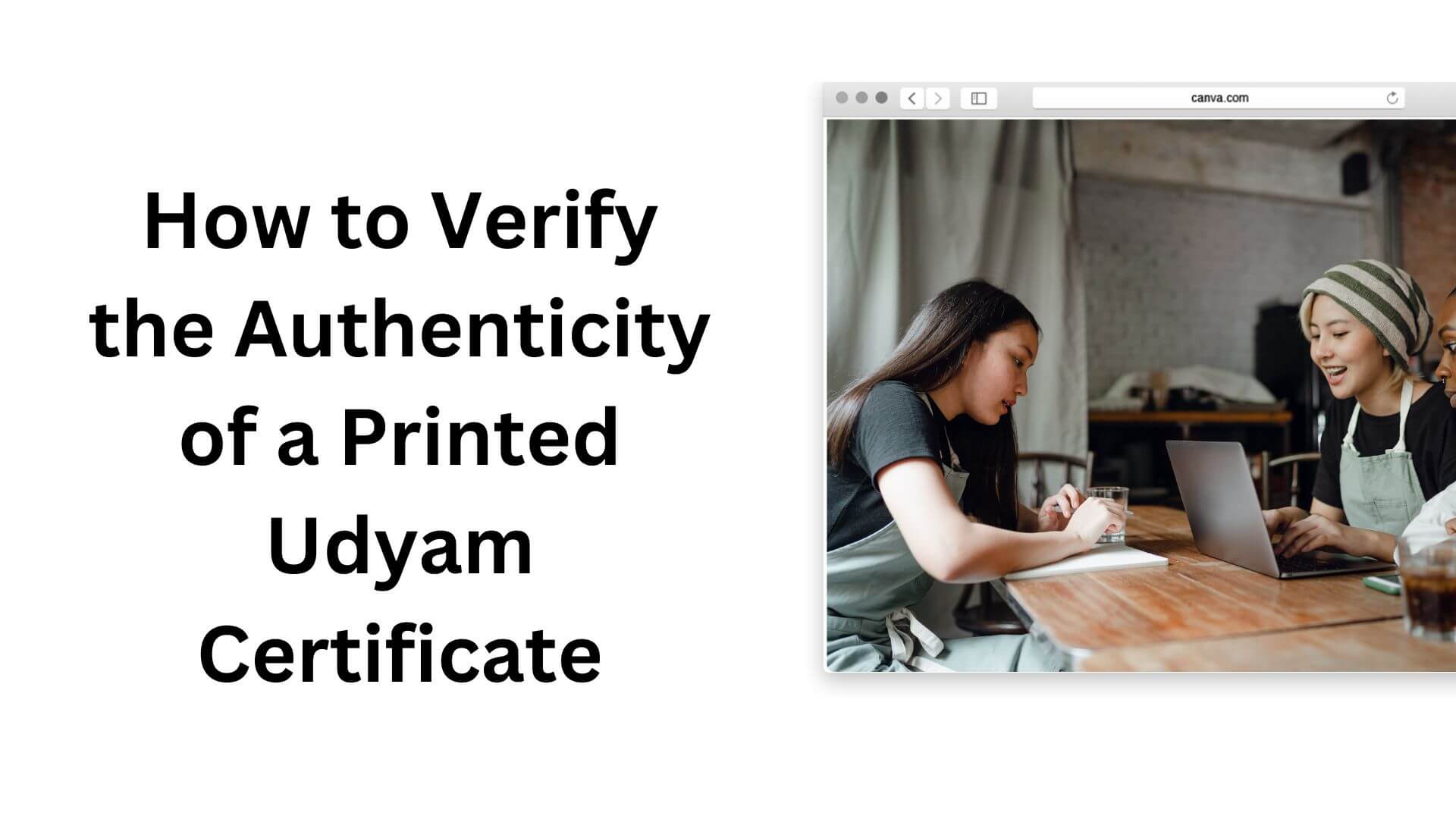How to Verify the Authenticity of a Printed Udyam Certificate

Udyam Registration is a government-initiated online process in India that aims to facilitate the ease of doing business for micro, small, and medium-sized enterprises (MSMEs). It replaces the earlier process of MSME registration known as Udyog Aadhaar registration. The Udyam Registration Online process is simple, free of cost, and can be completed entirely online.
Udyam Certificate serves as a crucial document for Micro, Small, and Medium Enterprises (MSMEs) in India, unlocking a realm of benefits and opportunities. In an age where digital manipulation is a concern, it’s essential to ensure the authenticity of a printed Udyam Certificate to prevent any fraudulent practices. This article outlines methods to verify the legitimacy of such certificates, ensuring that businesses can confidently engage with partners, stakeholders, and government authorities.
Verifying Udyam Certificate Authenticity:
Online Verification Portal:
The Indian government provides an official online verification portal where you can enter the Udyam Registration Number to check the authenticity of the certificate. This portal provides instant verification and confirms whether the certificate is genuine or not.
Government Websites and Portals:
Always rely on official government websites and portals to cross-reference Udyam Certificate details. Beware of unofficial websites that might offer false information or fraudulent verification services.
Ministry of MSME’s Helpline:
The Ministry of Micro, Small and Medium Enterprises offers a helpline to assist with Udyam-related queries. You can reach out to them to verify the authenticity of a Udyam Certificate by providing the registration details.
QR Code Verification:
Some Udyam Certificates might include QR codes that can be scanned using a smartphone. These QR codes can lead you to an official verification page, providing real-time confirmation of the certificate’s legitimacy.
Physical Copies with Watermarks:
Official Udyam Certificates often have security features like watermarks, holograms, or other anti-counterfeit measures. Inspect the physical copy for such features to validate its authenticity.
Importance of Authenticity:
Verifying the authenticity of a printed Udyam Certificate is crucial for several reasons:
Credibility:
A genuine certificate establishes your business’s credibility when dealing with partners, suppliers, clients, and financial institutions.
Legal Compliance:
Authentic certificates ensure that you’re adhering to government regulations and can confidently participate in schemes and benefits.
Avoiding Fraud:
In an era of digital scams, ensuring certificate authenticity safeguards your business from potential fraud and identity theft.
Eligibility for Schemes:
Many government schemes require a valid Udyam Certificate. An authentic certificate ensures you can access the benefits without interruption.
Techniques for Thorough Verification:
Check Government Seal and Logo:
An authentic Udyam Certificate will bear the official seal and logo of the Ministry of Micro, Small and Medium Enterprises. Verify that these elements are present and accurately rendered on the printed certificate.
Compare with Digital Copy:
If you have access to the digital copy of your Udyam Certificate, compare the details on the printed version with the digital version. Any discrepancies should raise suspicion.
Contacting Authorities:
If you have doubts about the authenticity of a Udyam Certificate, you can directly contact the Udyam helpline or the concerned government department. They can assist you in verifying the legitimacy of the certificate.
Third-Party Verification Services:
There are third-party verification services that specialize in verifying official documents, including Udyam Certificates. While using these services, ensure that they are reputable and authorized by relevant government bodies.
Educational Initiatives:
The government and various industry associations often conduct awareness programs to educate business owners about the authenticity of official documents, including Udyam Certificates. These programs provide guidance on recognizing genuine certificates and avoiding potential pitfalls of counterfeit documents.
Documenting Verification:
Maintaining a record of the steps taken to verify the authenticity of a Udyam Certificate can be invaluable. This record not only ensures transparency but also serves as evidence in case of any future disputes or concerns regarding the certificate’s legitimacy.
Continuous Vigilance:
It’s important to note that the verification process isn’t a one-time task. With the advancement of technology and the potential for fraudulent activities, maintaining a continuous sense of vigilance is crucial. Regularly revisit the verification steps if you’re engaging in partnerships, seeking funding, or accessing government benefits.
Also read msme registration for small business
Conclusion:
Verifying the authenticity of a printed Udyam Certificate is a responsibility that every MSME owner should take seriously. The methods and techniques mentioned in this article empower business owners to confidently assess the legitimacy of their certificates, ensuring compliance with regulations and building credibility within the business ecosystem. In an era where digital manipulations and fraudulent practices are on the rise, adopting a proactive approach to verification safeguards businesses from potential risks and strengthens their position in the marketplace.



